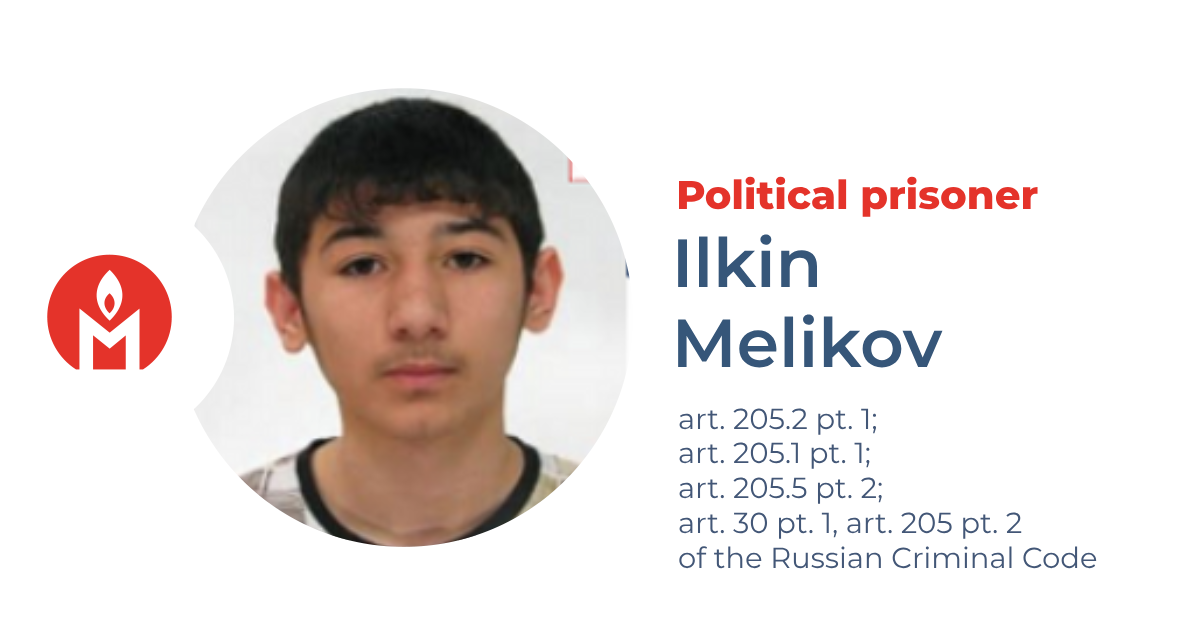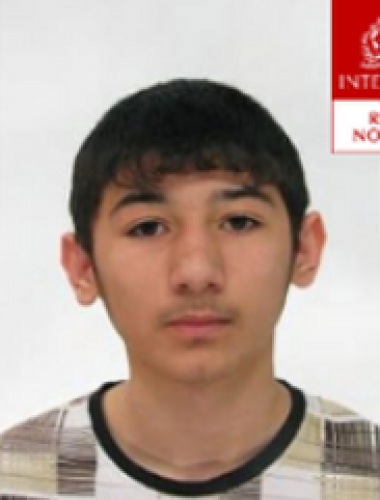Ilkin Melikov is a political prisoner
Ilkin Melikov and five other Muslims from Nizhnevartovsk are being prosecuted on charges of terrorism and trafficking in arms and drugs, based on dubious allegations of involvement in ISIS
The ‘Political Prisoners. Memorial’ human rights project, in accordance with international standards, considers Ilkin Melikov a political prisoner. He is being prosecuted on criminal charges of participation in a terrorist organisation, assisting and inciting terrorism, preparing an act of terrorism, and possession of weapons and explosives, for alleged participation in the so-called ‘Nizhnevartovsk Jamaat’ of ISIS. Melikov’s prosecution violates his right to a fair trial and contains indications of falsification of evidence. We demand the immediate release of Ilkin Melikov and that all criminal charges against him be dropped.
Eduard Amirov, Albert Ilyasov, Ilmir Khamitov, Robert Khabibullin, and Natik Dzhabiev have already been convicted on charges of participation in a terrorist group and terrorist organisation, assisting and inciting terrorism, preparing an act of terrorism, and possession of weapons and explosives. Amirov, Ilyasov, Khamitov, and Khabibullin were accused of participating in ‘Nizhnevartovsk Jamaat,’ while Dzhabiev was accused of heading the organisation. Three of the defendants were also convicted on drug trafficking charges. Their criminal prosecutions and convictions showed signs of political motivation and legal violations. We demand that their cases be reviewed in a fair trial. We also demand a full investigation into their allegations of torture and other illegal practices, and that those responsible be held to account.

What are the charges in the case of the ‘Nizhnevartovsk Jamaat’?
In April 2019, Natik Dzhabiev was detained in Nizhnevartovsk. He had planned to travel to the UK to seek political asylum because of increased scrutiny from Russia’s security services. After searching his person and his home, the authorities claimed to have found an explosive device and drugs. Dzhabiev was charged with illegal possession of these banned substances. At that time, he confessed to the charges.
On 18 and 19 September 2019, Albert Ilyasov, Eduard Amirov, Ilmir Khamitov, Robert Khabibullin, and Ilkin Melikov were detained. The investigation claimed that Amirov was found with a grenade and ammunition, while Khamitov allegedly had a training mine, a pistol, cartridges, and drugs. All were charged with participating in the terrorist organisation ‘Nizhnevartovsk Jamaat.’ In December 2019, Dzhabiev was additionally charged with creating and leading the organisation. At that point, he retracted his earlier confession, stating that the explosives and drugs had been planted during his arrest.
All except Khabibullin and Melikov were remanded in custody. In March 2020, Khabibullin was remanded in custody when drugs were allegedly found on his person. Melikov managed to leave the country and request asylum in Georgia. However, in April 2022 he was abducted by unknown individuals in Tbilisi and taken to Russia.
All defendants in the case had attended a mosque in Nizhnevartovsk. The prosecutors claimed that Natik Dzhabiev spread ISIS propaganda among worshippers and created a terrorist group, which in 2015 became an organisation. Its alleged members were accused of financing ISIS fighters in Syria and preparing a terrorist attack in Nizhnevartovsk. Three of the accused were also charged with distributing drugs among the group for ‘purposes of relaxation.’ In addition, all ‘members of the Jamaat’ were accused of possessing weapons and explosives as part of an ‘organised group’ — items allegedly found in the possession of Dzhabiev, Khamitov and Amirov.
On 27 December 2023, a military court sentenced Natik Dzhabiev to 19 years in a strict regime penal colony, Ilmir Khamitov to 14 years, Albert Ilyasov to 13 years, and Eduard Amirov to 12 years. The four men are each to serve the first seven years of their sentences in a cell-type prison. Each was also fined 250,000 roubles and sentenced to an additional year of probation after their release. Robert Khabibullin was declared of unsound mind and sent for compulsory psychiatric treatment.
At their trials, the defendants said that the banned items had been planted on them and that the confessions they had made at the time of their arrests had been given under torture and threats.
Ilkin Melikov’s trial has been ongoing since February 2023. If convicted, he faces up to 30 years’ imprisonment. Melikov denies all the charges against him.
Why do we consider Melikov a political prisoner and the other defendants victims of unlawful politically motivated prosecutions?
Based on the case materials, we consider the prosecutions of the Muslims from Nizhnevartovsk to be unlawful.
The investigative authorities lacked evidence to unequivocally prove their guilt. There were no video or audio recordings, phone records, DNA traces, or fingerprints of the defendants on the seized items. Most witnesses in the case were classified, and their testimony was contradictory. Much of the evidence we analysed showed signs of having been falsified or obtained in violation of legal procedures.
The court failed to give due weight to the defendants’ allegations of torture and coercion.
We believe that in such circumstances it is impossible to reach a definitive conclusion about the defendants’ guilt, and therefore their case must be reheard in a fair trial.
At the same time, we have concluded that Ilkin Melikov is innocent. He is being prosecuted for his religious beliefs, based on unproven links to the ‘Nizhnevartovsk Jamaat’, an organisation the very existence of which is highly doubtful.
A detailed description of the case of the ‘Nizhnevartovsk Jamaat’ and of our position is available on our website.
Recognition of individuals as political prisoners or as being prosecuted with significant legal violations for political reasons does not imply the ‘Political Prisoners. Memorial’ human rights project agrees with, or approves, their views, statements, or actions.
How can you help?
You can write letters to four of those convicted at the following addresses:
In Russian:
624860, Свердловская область, г. Камышлов, ул. Урицкого 16 б, ФКУ СИЗО-4 ГУФСИН России по Свердловской области, Джабиеву Натику Адиловичу 1992 г. р.
623850, Свердловская область, г. Ирбит, ул. Кирова, д. 29 А, ФКУ СИЗО-2 ГУФСИН России по Свердловской области, Амирову Эдуарду Ханифовичу 1990 г. р.
620024, г. Екатеринбург, ул. Елизаветинское шоссе д. 19, ФКУ СИЗО-5 ГУФСИН России по Свердловской области,
– Хамитову Ильмиру Зуфаровичу 1987 г. р.
– Меликову Илькину Шафи оглы 1995 г. р.
620019, г. Екатеринбург, ул. Репина, д. 4, ФКУ СИЗО-1 ГУФСИН России по Свердловской области, Ильясову Альберту Ильясовичу 1988 г. р.
In English:
Natik Adilovich Dzhabiev (born 1992), Remand Prison No. 4, Federal Penitentiary Service of Russia for Sverdlovsk Oblast, 16b Uritskogo Street, Kamyshlov, Sverdlovsk Oblast, 624860, Russia.
Eduard Khanifovich Amirov (born 1990), Remand Prison No. 2, Federal Penitentiary Service of Russia for Sverdlovsk Oblast, 29A Kirova Street, Irbit, Sverdlovsk Oblast, 623850, Russia.
– Ilmir Zufarovich Khamitov (born 1987),
– Ilkin Shafi ogly Melikov (born 1995),
Remand Prison No. 5, Federal Penitentiary Service of Russia for Sverdlovsk Oblast, 19 Yelizavetinskoe Shosse, Yekaterinburg, 620024, Russia.
Albert Ilyasovich Ilyasov (born 1988), Remand Prison No. 1, Federal Penitentiary Service of Russia for Sverdlovsk Oblast, 4 Repina Street, Yekaterinburg, 620019, Russia.
You can also send an email via ZT (for payment with Russian bank cards), OVD-Info and Memorial-France (free of charge).
Please note that letters in languages other than Russian are highly unlikely to reach the recipient.
You can donate to help all political prisoners in Russia.
